ALL QUIZ QUESTION EXAM 1 GENBIO2
1/57
There's no tags or description
Looks like no tags are added yet.
Name | Mastery | Learn | Test | Matching | Spaced | Call with Kai |
|---|
No analytics yet
Send a link to your students to track their progress
58 Terms
A node or branching point on a phylogenetic tree represents a _____
shared trait
creation event
speciation event
mutation
speciation event
A phylogenetic that hypothesizes the fewest changes is said to be most ___.
Parsimonious
Analogous
Homologous
Unlikely
Parsimonious
The _______ species concept is based on the idea that a species is a branch or lineage on the tree of life, all descending from a common ancestor.
Evolutionary
Biological
Parsimonious
Genetic
Evolutionary
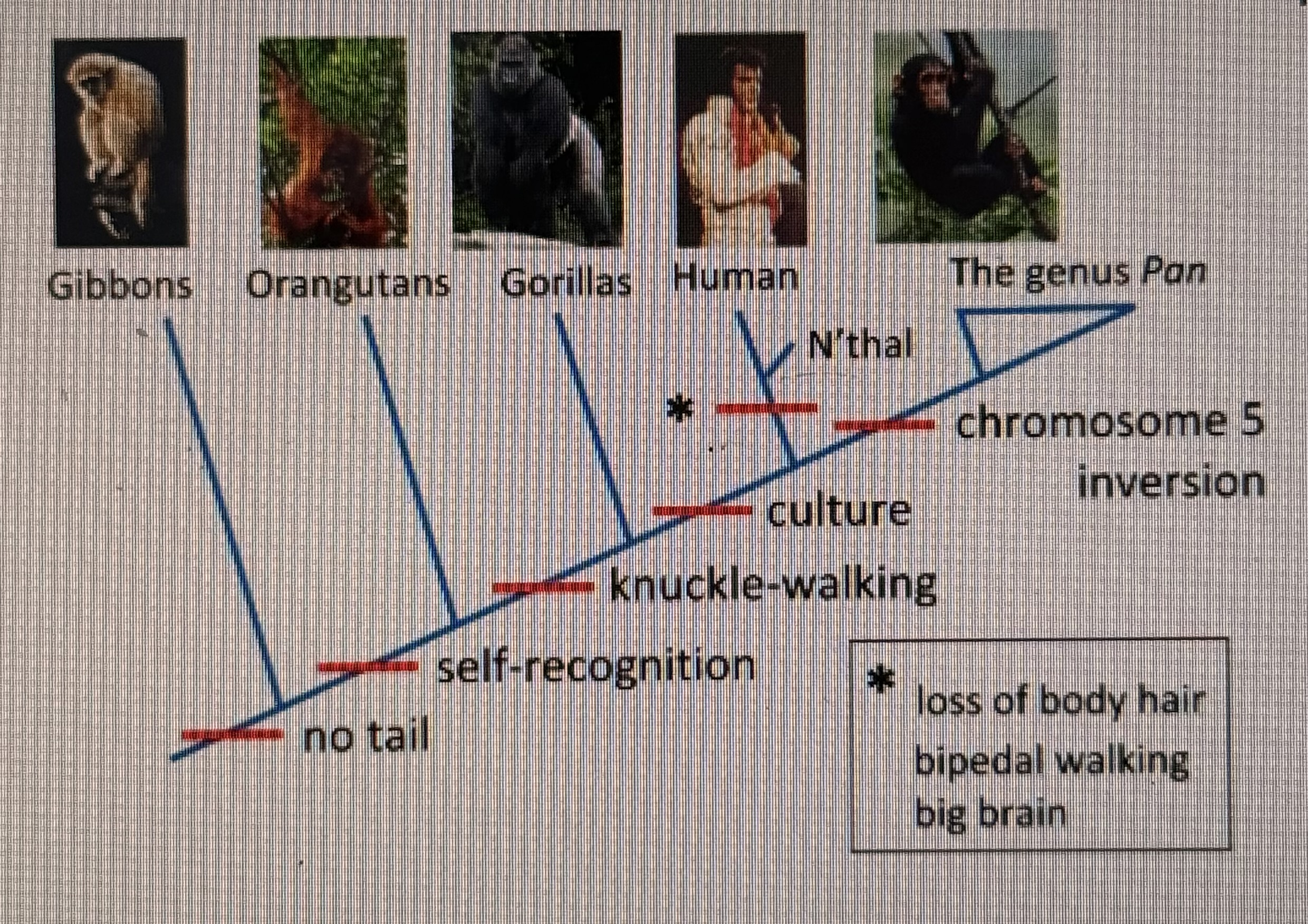
Using this phylogenetic tree, which character state separates the sister genera Homo (Humans) and Pan?
Self-recognition
Presence of tail
Chromosome 5 inversion
Culture
Chromosome 5 inversion
In this table the highlighted cells are considered ____ traits.
Character:
1. Macaque (outgroup)
2. bonobo
3. chimp
4. human
5. gorillas
6. orangutan
7. gibbons
Self recognition:
1. no
2. yes
3. yes
4. yes
5. yes
6. yes
7. no
Adaptation for land locomotion:
1. quadruped
2. knuckle-walking
3. knuckle-walking
4. biped
5. knuckle-walking
6. quadruped
7. quadruped
Chromosome 5 inversion:
1. no
2. yes
3. yes
4. no
5. no
6. no
7. no
ancestral
analogous
derived
deleterious
ancestral
Which of the following would make for a good outgroup to the Apes, when building their phylogeny?
E. coli (a bacterium)
Live Oak (a deciduous tree)
Rhesus Monkey (an old-world primate)
Rattus rattus (the lab rat)
Rhesus Monkey (an old-world primate)
Modern Birds (Aves) and Crocodiles are sister taxa because they shared a MRCA, probably a flightless ____ that went extinct millions of years ago.
Mammal
Dinosaur
Fish
Arthropod
Dinosaur
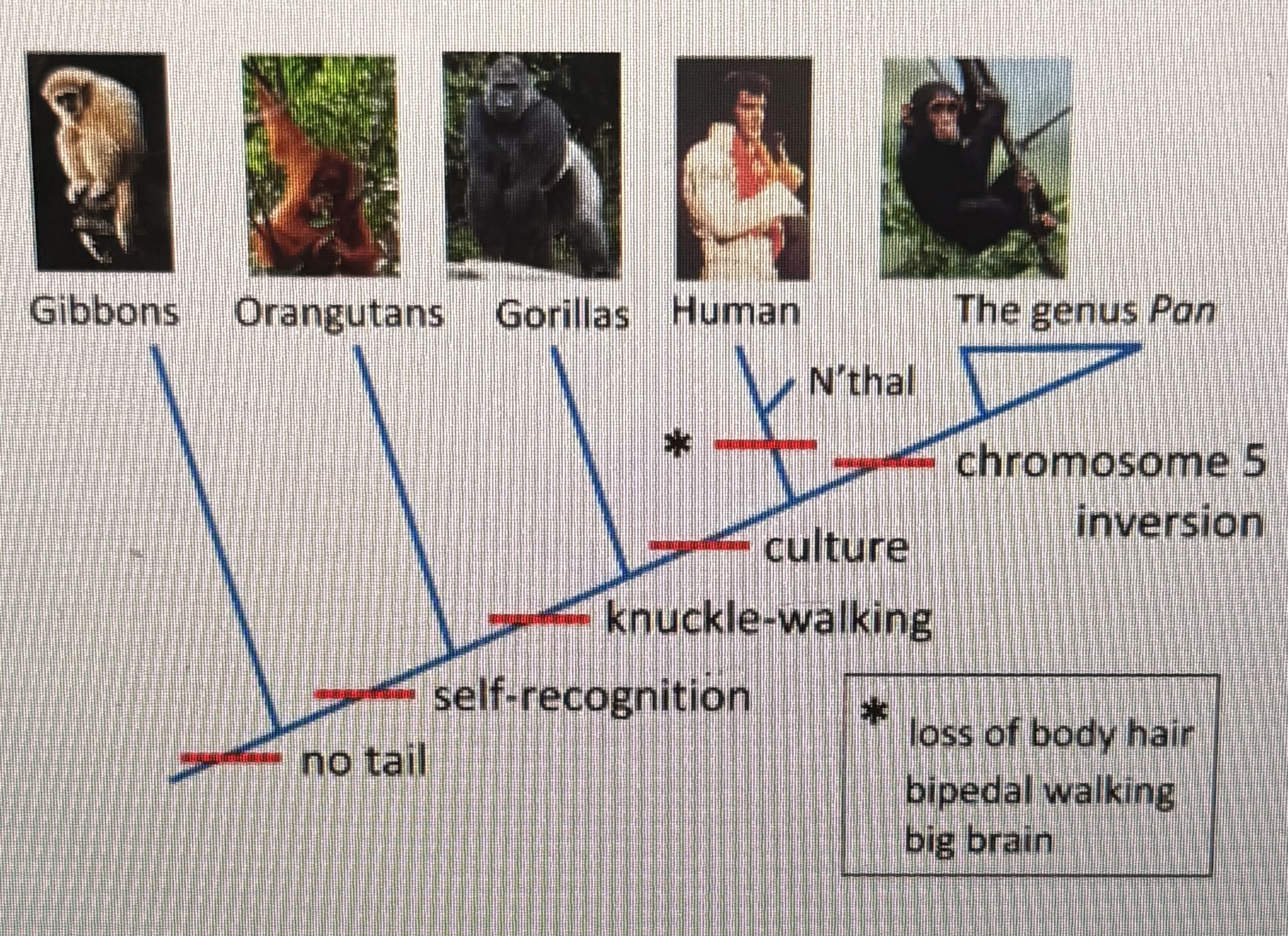
Based on this phylogenetic tree, which trait is most helpful in showing that the "Great Apes" (orangutan, gorilla, human, Pan) diverged from the Gibbons and formed a sister clade?
sself-recognition
culture
chromosome 5 inversion
bipedal locomotion
self-recognition
The evidence shows that life began appearing when (or at least occurred soon after) ___ became abundant on the surface of Earth.
Hydrogen
Water
Plants
Insects
Water
Which of the following statements best describes the RNA World Hypothesis about the origin of life?
RNA developed after the formation of DNA and proteins to support and enhance their functions in primitive cells
RNA and DNA formed simultaneously as a result of the same chemical reactions in primordial soup
RNA molecules were the first to form as a byproduct of protein synthesis that took place in early cells
RNA molecules were the first catalytic molecules to appear on Earth, capable of storing genetic information and catalyzing chemical reactions
RNA molecules were the first catalytic molecules to appear on Earth, capable of storing genetic information and catalyzing chemical reactions
In the microcaves in the deep ocean, what compound was the substrate for the first metabolic processes?
Fe-S
Methane (CH4)
H2O
CO2
Fe-S
Which event stimulated the rapid development of eukaryotes (plants, fungi, animals)?
colonization of land
origin of multicellular organisms
extinction of the dinosaurs
addition of oxygen to atmosphere
addition of oxygen to atmosphere
We need new (novel) _____ because of rapid evolution within the target viral genome.
analgesics
vaccines
antibiotics
chemotherapies
vaccines
Viral ____ can only occur when their genome hijacks a host cell and tricks it into producing more viruses.
Translation
Metabolism
Replication
Transcription
Replication
What role do surface proteins play in a virus's lifecycle?
Synthesize viral RNA
Degrade host cell DNA
Assist in the virus's attachment to the host cell
Inactivate the host's immune response
Assist in the virus's attachment to the host cell
Bacteria use _____ to recombine genes.
Pheromonal transference
Horizontal gene transfer
Sexual fertilization
Diffusion and osmosis
Horizontal gene transfer
What is the name for the transfer of genetic information from one bacterium to another bacterium by a phage?
Transduction
Conjugation
Transformation
Transcription
Transduction
When a mixed species aggregation of cells covers a surface, it creates a ___.
Fruiting body
Streptococcal colony
Biofilm
Polyp
Biofilm
Most bacteria reproduce via ______
Fragmentation or Budding
Binary Fission
Parthenogenesis
Sexual fertilization
Binary Fission
Communal reproduction in bacteria occurs inside _____
Gram-negative cells
Fruiting bodies
Spirochetes
Gram-positive cells
Fruiting bodies
According to the endosymbiotic theory of the origin of eukaryotic cells, how did mitochondria originate?
from engulfed, originally free-living proteobacteria
by secondary endosymbiosis
from infoldings of the plasma membrane, coupled with mutations of genes for proteins in energy-transfer reactions
when a protoeukaryote engaged in a symbiotic relationship with a protocell
from engulfed, originally free-living proteobacteria
Which statement is correct with regard to the comparison of secondary endosymbiosis to primary endosymbiosis?
Primary and secondary endosymbiosis are essential equivalent but occurred at different points in time in the evolution of life.
In secondary endosymbiosis, an entire free-living alga is incorporated into the mitochondrion a heterotrophic eukaryote.
Primary endosymbiosis is the result of alga being engulfed by a cyanobacterium.
In secondary endosymbiosis, an entire free-living alga is ingested into the food vacuole of a heterotrophic eukaryote.
In secondary endosymbiosis, an entire free-living alga is ingested into the food vacuole of a heterotrophic eukaryote.
Most evidence suggests that ___ were incorporated into eukaryotes first.
Flagella
Mitochondria
Chloroplast
Plasmids
MItochondria
Which of the following was derived from an ancestral photosynthetic cyanobacterium?
Mitochondria
Hydrogenosome
Nucleus
Chloroplast
Chloroplast
Plastids (chloroplast-like organelles) that are surrounded by more than two membranes are evidence of _____.
Secondary endosymbiosis
Evolution of mitochondria
Primary endosymbiosis
Fusion of plastids
Secondary endosymbiosis
Plants that partition their photosynthetic pathways spatially in mesophyll and bundle sheath cells are known as ___ plants
Calvin
CAM
C3
C4
C4
CAM plants keep stomata closed in daytime, thus reducing loss of water. They can do this because they ______.
fix CO2 into organic acids in the bundle-sheath cells, which do not rely on stomata.
obtain CO2 through their roots during the day.
fix CO2 into by combining it with RuBP in the Calvin cycle
fix CO2 into organic acids during the night when temperatures are cooler.
fix CO2 into organic acids during the night when temperatures are cooler.
Photosynthesis converts ____ energy into ____ energy stored in sugars
Chemical; Physical
Solar; Mechanical
Solar; Chemical
Mechanical; Chemical
Solar; Chemical
Which color is most reflected in a green plant?
Green
Red
Yellow
Blue
Green
The molecules that absorb light energy are
Phospholipids
Pigments
Mitochondria
Chloroplasts
Pigments
____ attempts to link evidence from ecology, evolution, population genetics, taxonomy, morphology, geology, and biogeography together to explain biodiversity.
Intelligent Design
Modern Synthesis
Darwinism
Linnean Classification
Modern Synthesis
On a phylogenetic tree, which term refers to lineages that diverged from the same place?
Dichotomous taxa
Cousin species
Sister taxa
Basal taxa
Sister taxa
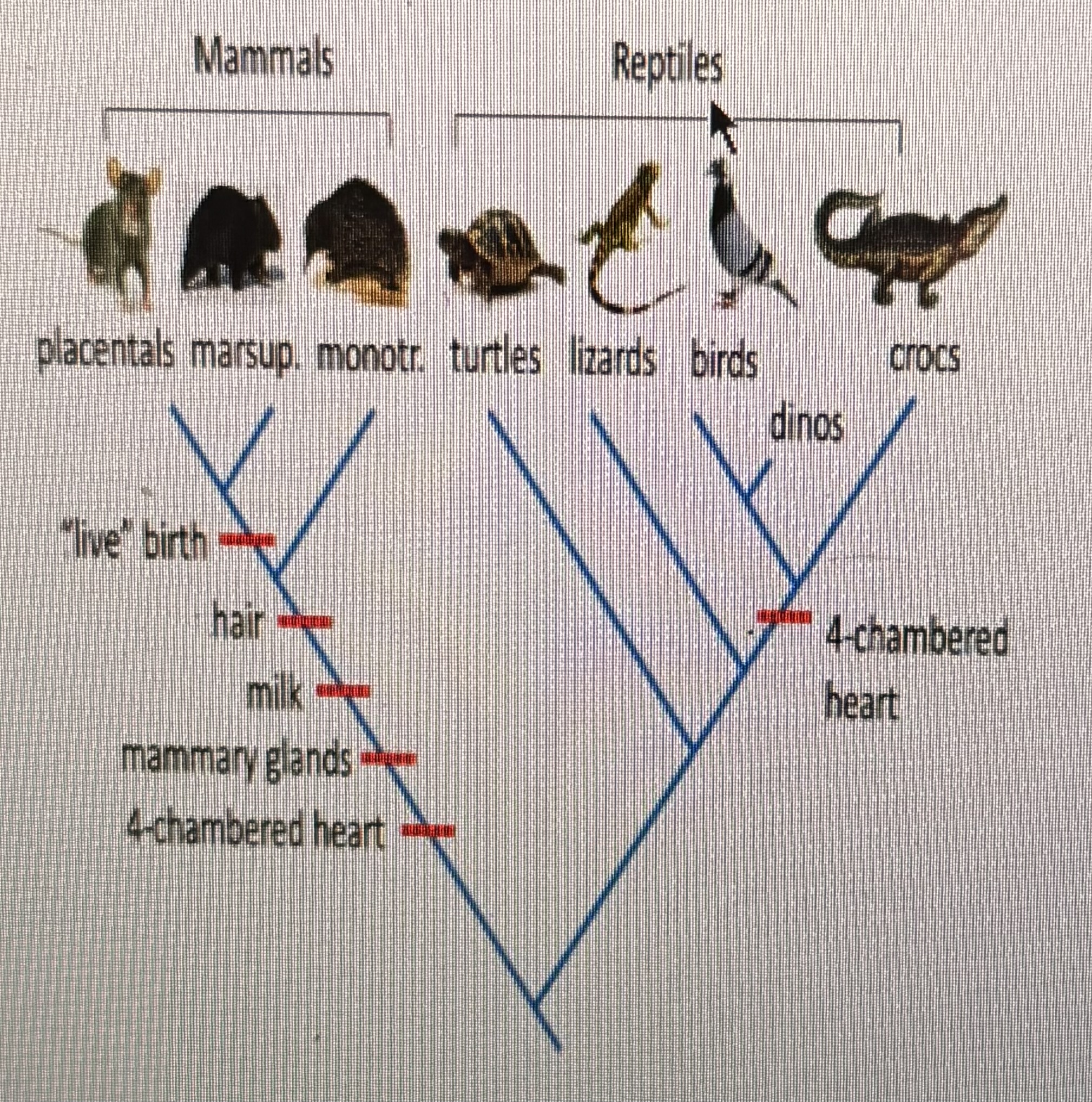
Based on this cladogram, all mammals _____ all reptiles.
have more developed hearts than
are more advanced than
are parsimonious with
are sister taxa to
are sister taxa to
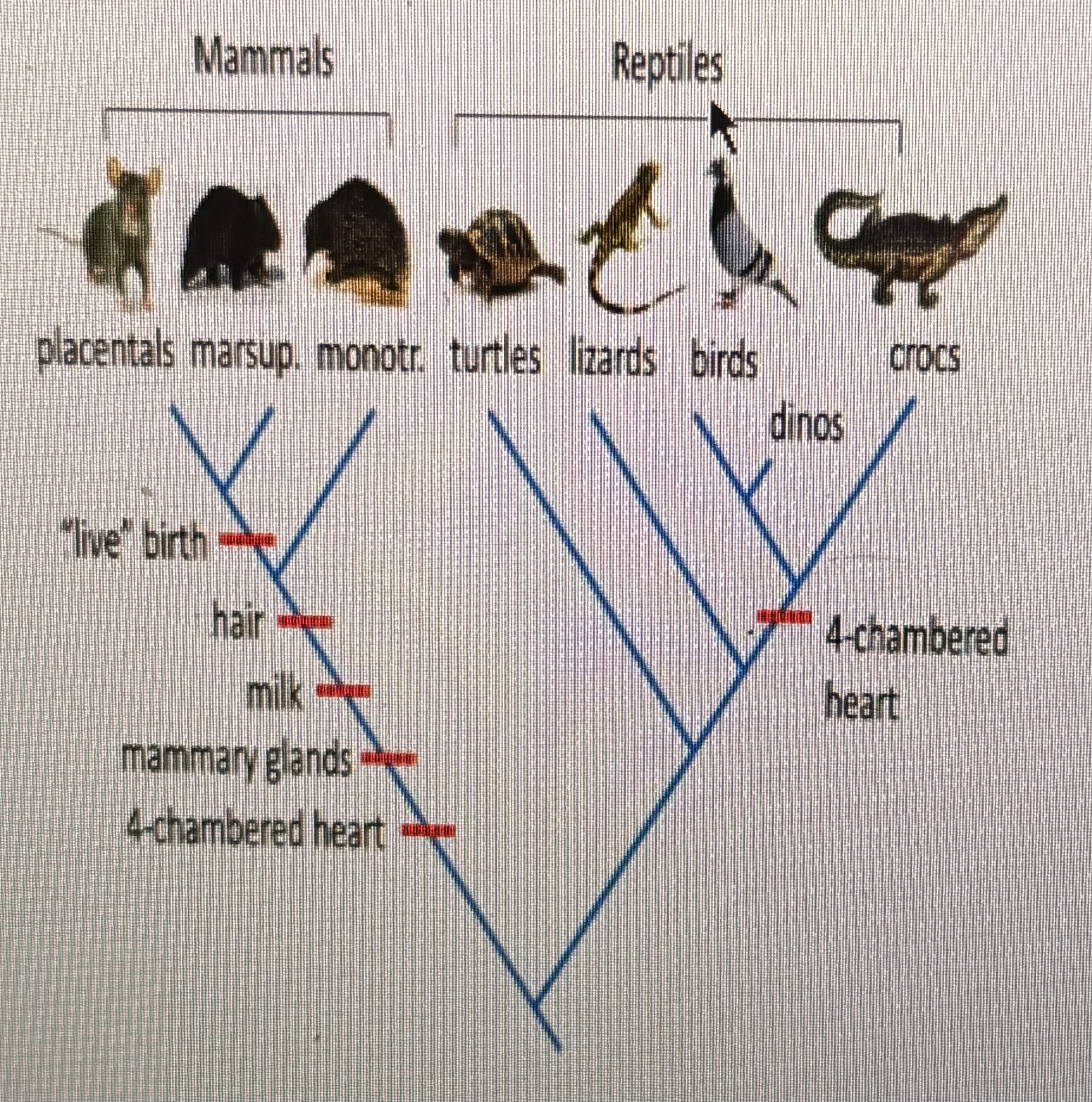
According to this cladogram, which mammalian feature distinguishes Placentals from Monotremes?
"live" birth
hair
big ears
long noses
"live" birth
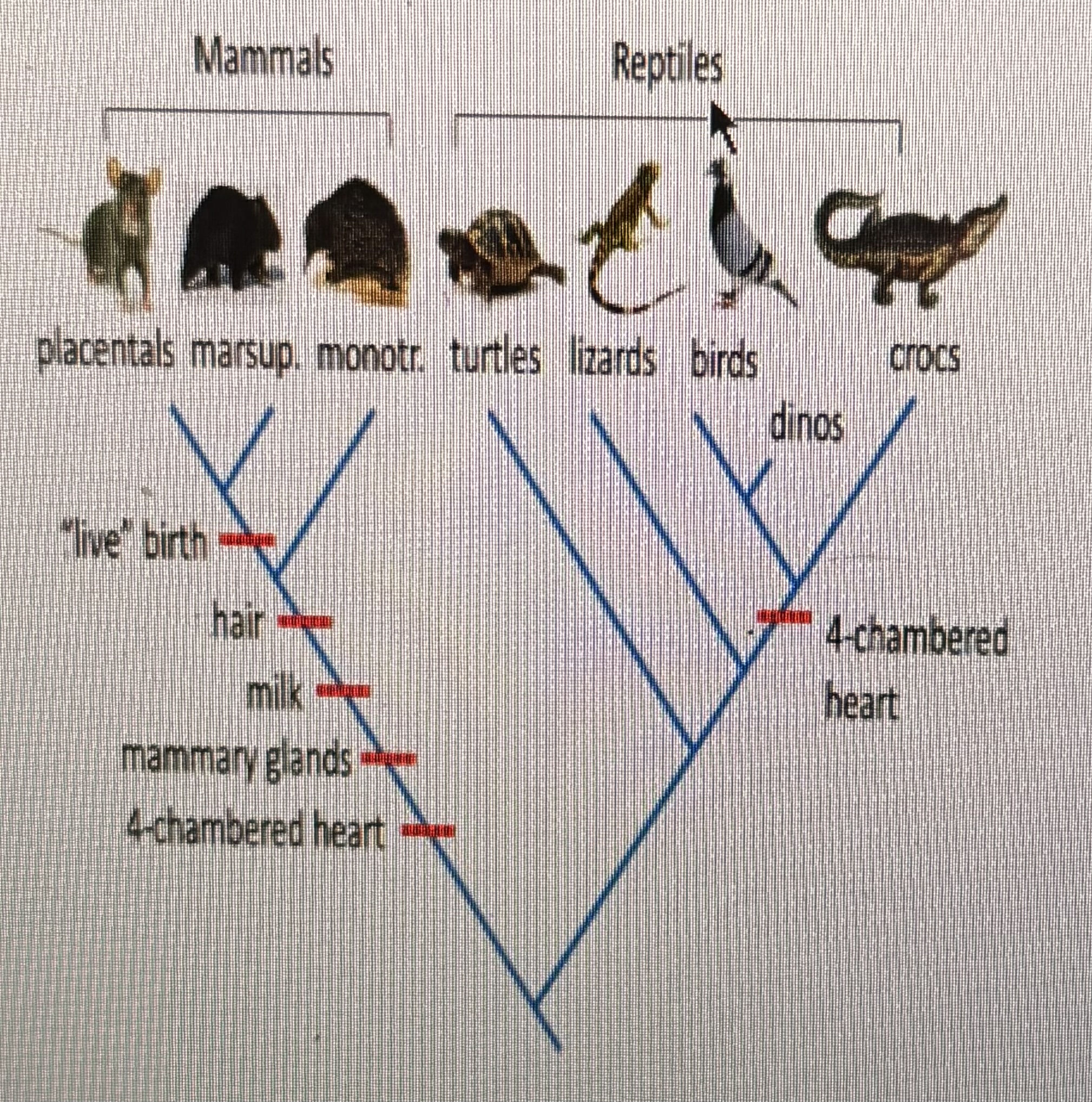
Based on this cladogram, which trait has evolved independently twice?
milk
hair
vertebrae
4-chambered heart
4-chambered heart
In the Metabolism-First Hypothesis, what is considered the most critical factor for the emergence of life?
Spontaneous formation of simple metabolic pathways that could self-organize and replicate
The existence of an already complete set of enzymes to carry out metabolic reactions
The presence of fully formed ribonucleotides from which RNA could be synthesized
The availability of sophisticated genetic information encoded in DNA
Spontaneous formation of simple metabolic pathways that could self-organize and replicate
For the last 4.5GYA (or so) the Sun's ___ has been ____.
Luminosity; increasing
Orbital velocity; decreasing
Gravitational pull; increasing
Intensity; decreasing
Luminosity; increasing
Bacteria have ____ regions of nucleic acids.
lattice-network
helical
circular
rod-shaped
circular
Internal membranes increase ____ for ____.
Surface area; Metabolism
Volume; Reproduction
Surface area; Replication
Volume; Metabolism
Surface area; Metabolism
Biologists think that endosymbiosis gave rise to mitochondria before plastids partly because ______
all eukaryotes have mitochondria (or their remnants), whereas many eukaryotes do not have plastids
the products of photosynthesis could not be metabolized without mitochondrial enzymes
mitochondrial DNA is less similar to prokaryotic DNA than is plastid DNA
without mitochondrial CO2 production, photosynthesis could not occur
all eukaryotes have mitochondria (or their remnants), whereas many eukaryotes do not have plastids
Eukaryotes are monophyletic and all contain _____, which stores and protects their genetic information.
Chloroplasts
Nuclei
Ribosomes
Mitochondria
Nuclei
Carbon fixation is catalyzed (sped up) by ____, a very abundant enzyme.
Helicase
Rubisco
Hemoglobin
Reactase
Rubisco
During the ____ carbon dioxide is converted into larger carbon chains or sugars.
Light-dependent reactions
Electron Transport Chain
Kreb's Cycle
Calvin cycle
Calvin cycle
Evidence that viruses are not alive includes the fact that they ____.
can mutate
can replicate
evolve
are non-cellular
are non-cellular
The ____ explains how some organelles have internal membranes and their own DNA.
Binary Fission
Multicellularity Drive
Parthenogenesis of Life
Endosymbiosis Theory
Endosymbiosis Theory
A phylogenetic tree that hypothesizes the fewest changes is said to be most ___.
Homologous
Unlikely
Analogous
Parsimonious
Parsimonious
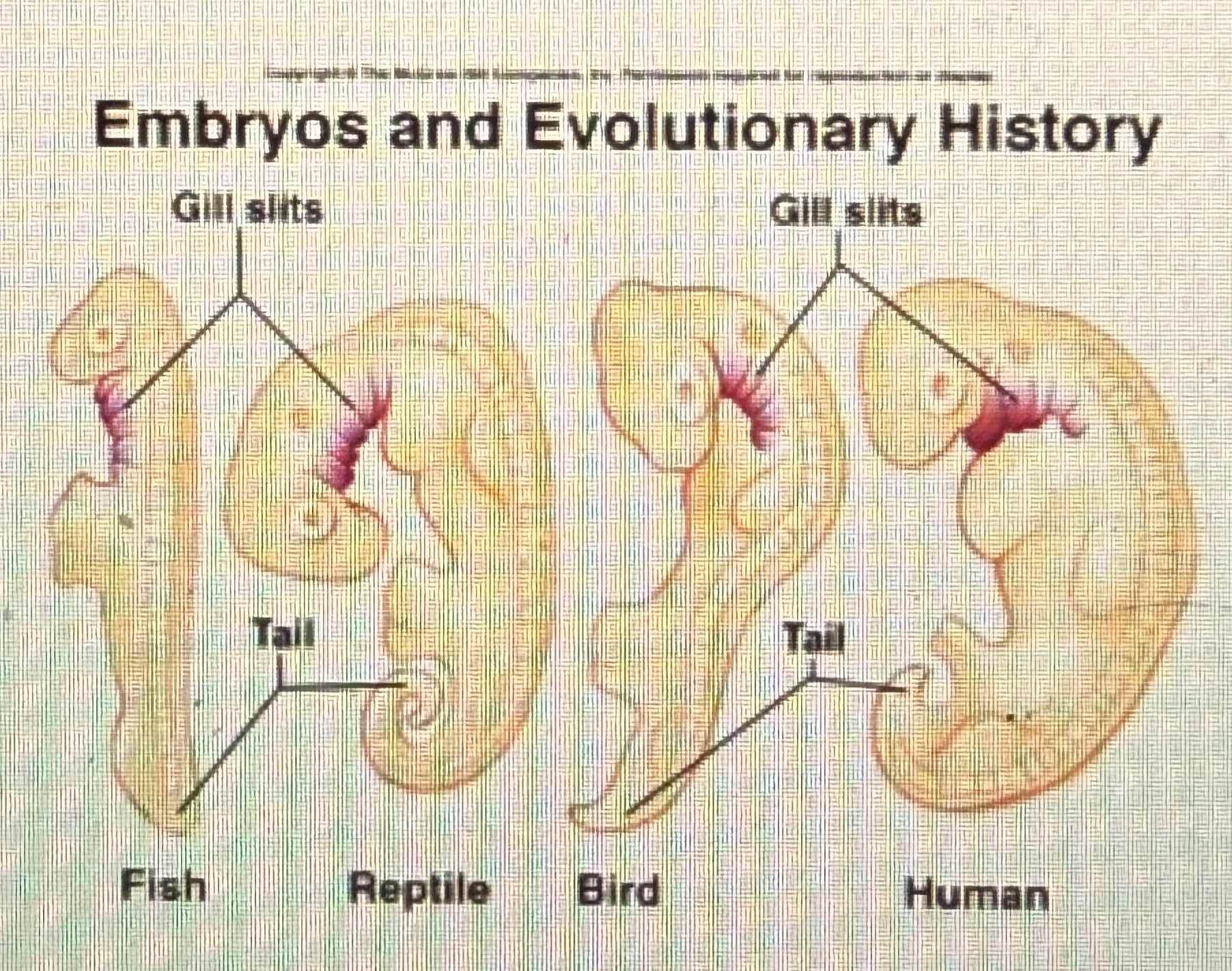
Some homologies can be informative, reflecting a shared evolutionary history. Focusing on embryonic development, which of these lines of evidence would be a "helpful" homology when constructing a tree for all tetrapods?
Location of ear
All embryonic features are homologous
Presence of gill slits & tails
No homologous features can be used to build a tree
Shape of eyes
Presence of gill slits & tails
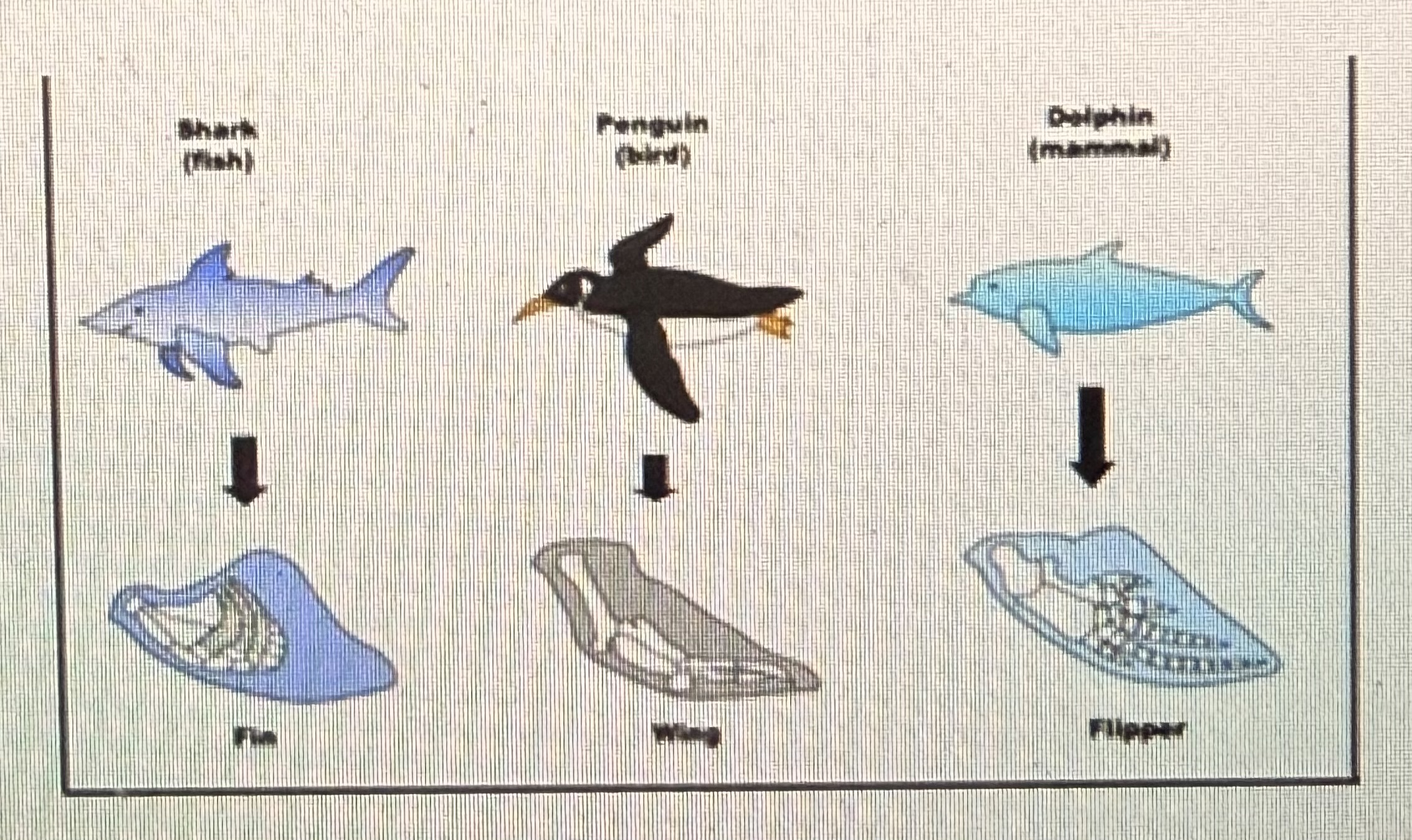
The three organisms below all use forelimbs to swim through the water. These appendages do not share an evolutionary history, they evolved from different features. Therefore they are ______ structures.
homologous
derived
heterologous
analogous
analogous
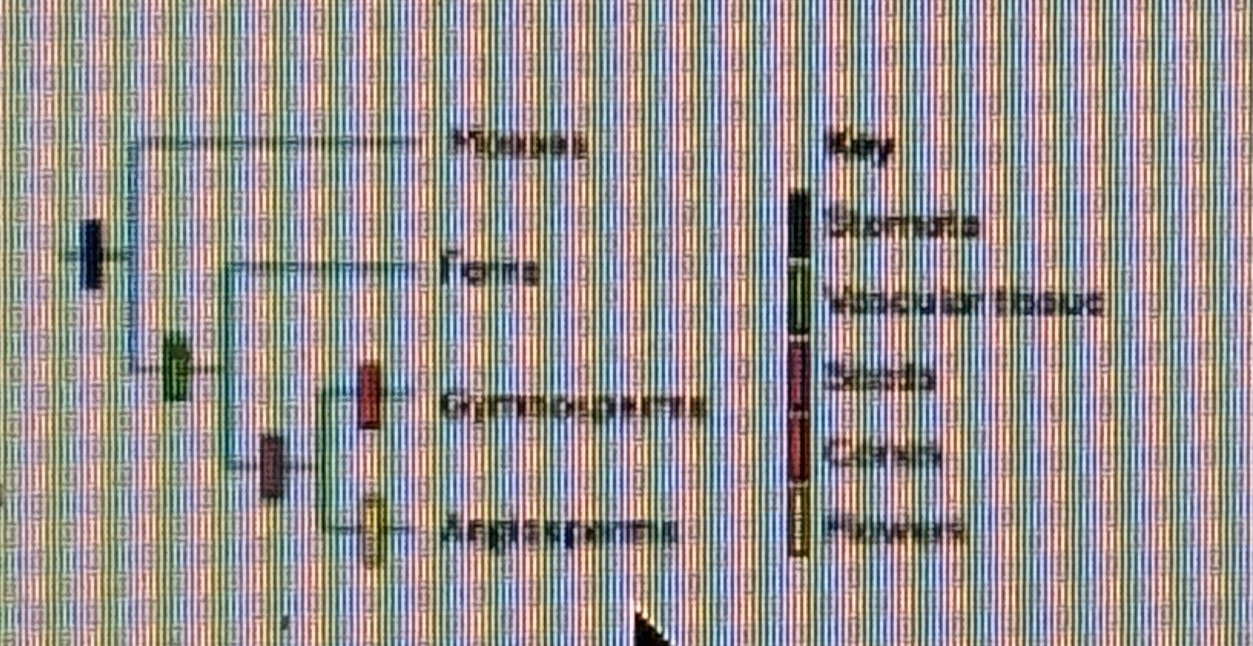
Based on the plant cladogram below, the trait of vascular tissue is ___ for angiosperms and ___ for ferns.
Ancestral; Ancestral
Ancestral; Derived
Derived; Ancestral
Derived; Derived
pAncestral; Derived
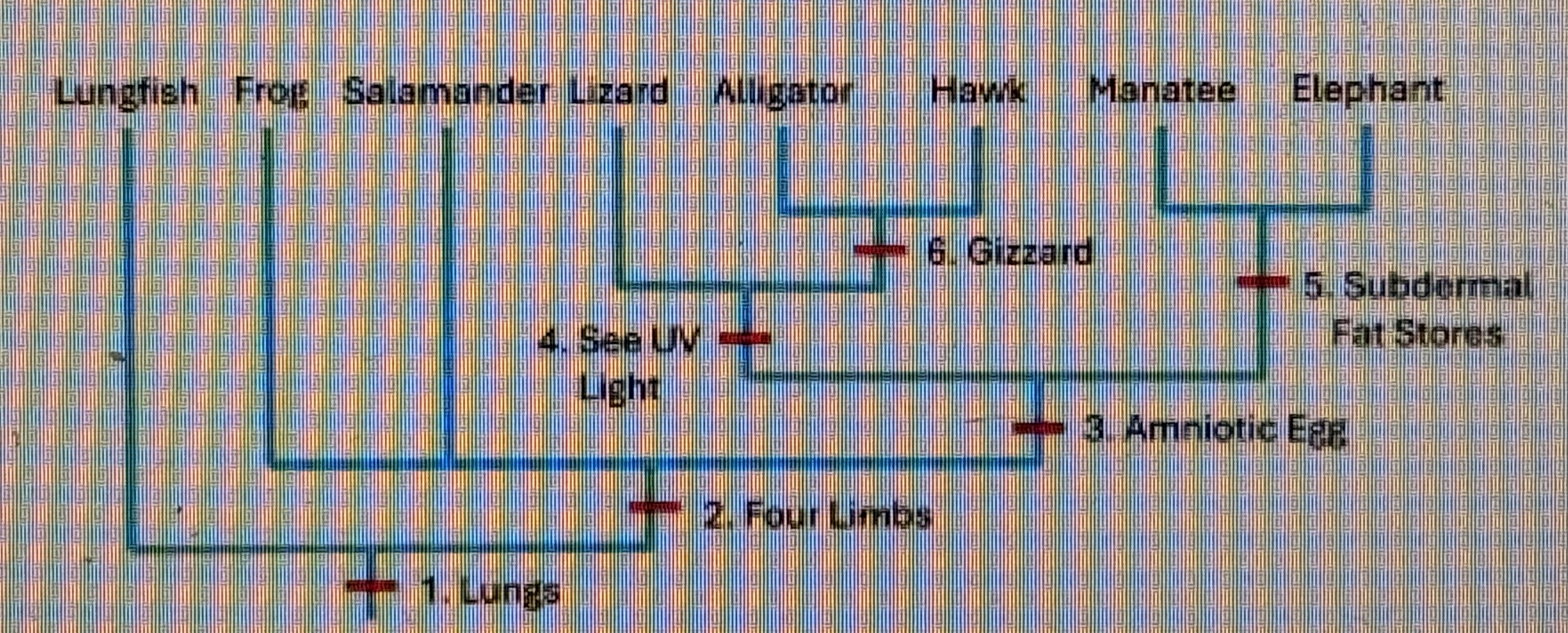
This cladogram above shows proposed phylogenetic relationships for several vertebrates. Selected derived traits are indicted on the cladogram by numbered labels. Based on the information presented, which of the derived traits is shared by alligators and manatees but not salamanders?
Give your answer as the number label of a character indicated on the cladogram.
4
2
1
3
3
Which situation is most likely an example of convergent evolution?
All of these are examples of convergence
Squid and human have eyes similar in structure
Some bats and birds have wings that allow them to fly
Worms and snakes both move without legs
All of these are examples of convergence
A set of shared, derived traits that define a clade is called a:
Synapomorphy
Cladogram
Transposon
Convergence
Synapomorphy
Why do scientists apply the concept of maximum parsimony?
To decipher accurate phylogenies
To locate homoplasies
To eliminate analogous traits
To identify mutations in DNA codes
To decipher accurate phylogenies
When a character matrix is arranged with the fewest changes, it is said to be:
Harmonious
Homologous
Parsimonious
Analogous
Parsimonious
According to the Progressive Hypothesis, what is the main driver behind the origin of viruses?
Horizontal gene transfer
Metabolic dependency
Symbiotic relationships
Genetic material escaping from cells
Genetic material escaping from cells
Some bacteria form a thick-walled _____ in response to poor nutrient conditions.
Sheath
Pilus
Endospore
Capsid
Endospore
This cladogram above shows proposed phylogenetic relationships for several vertebrates. Selected derived traits are indicted on the cladogram by numbered labels. Based on the information presented, which of the derived traits is shared by alligators and manatees but not salamanders?
Give your answer as the number label of a character indicated on the cladogram.
4
2
1
3
3
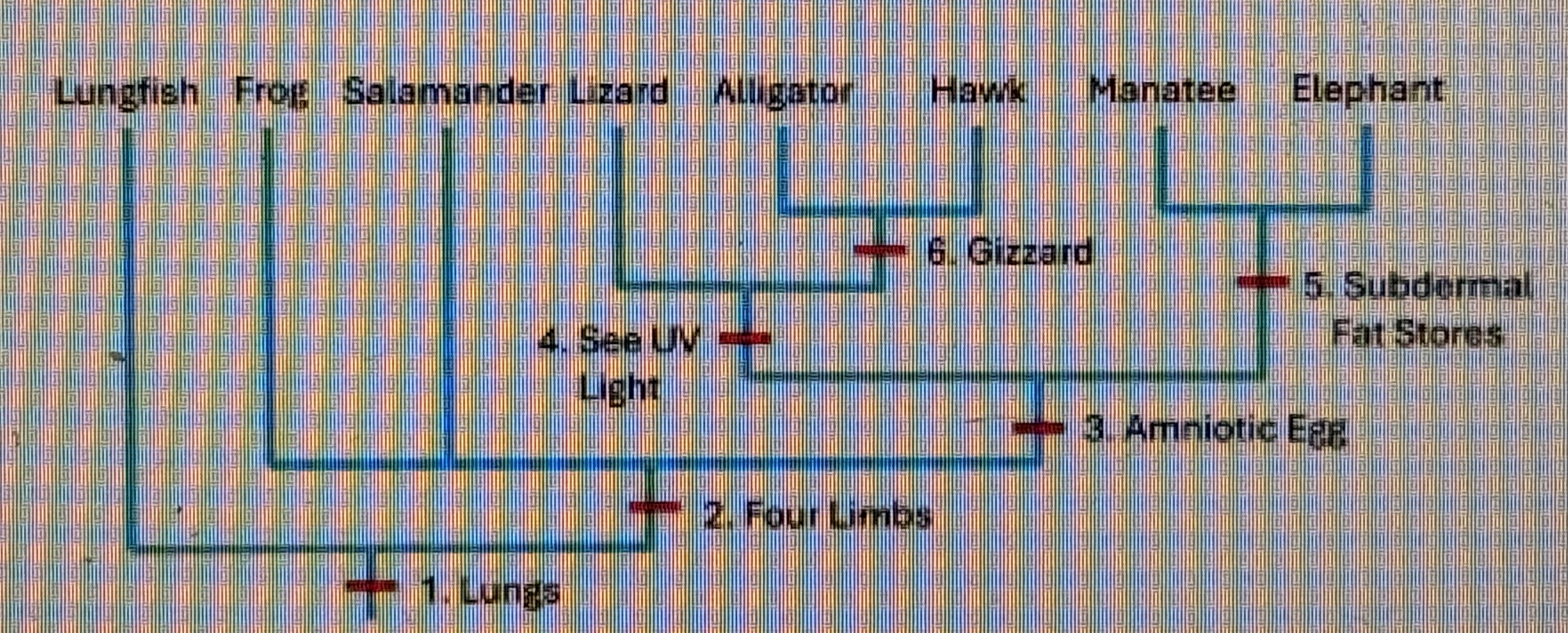
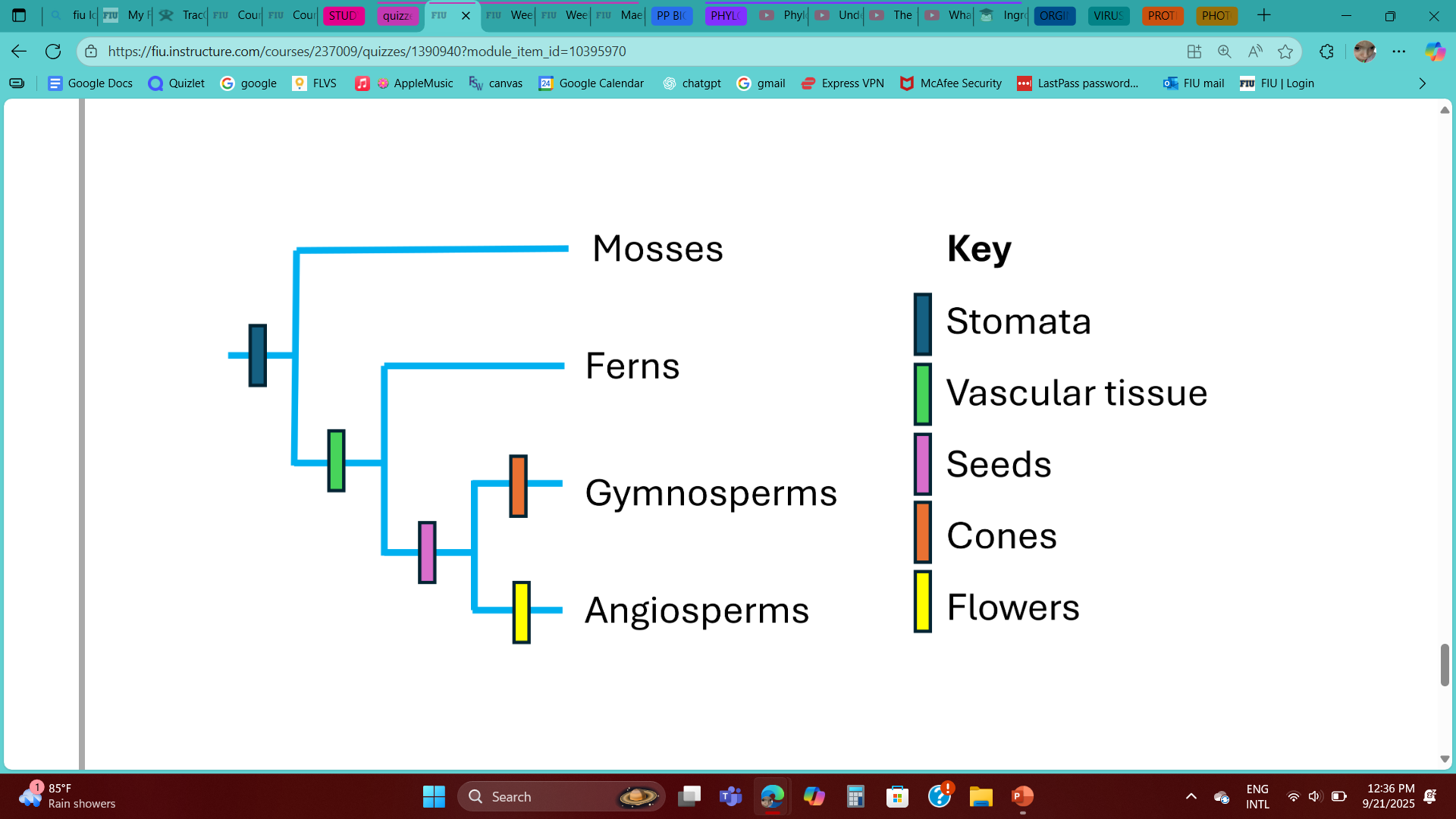
Based on the plant cladogram below, the trait of vascular tissue is ___ for angiosperms and ___ for ferns.
Ancestral; Ancestral
Ancestral; Derived
Derived; Ancestral
Derived; Derived
Ancestral; Derived